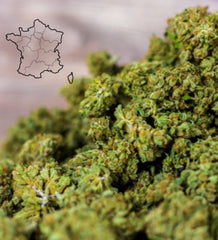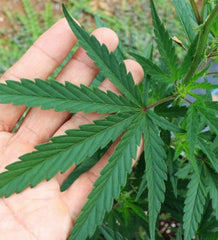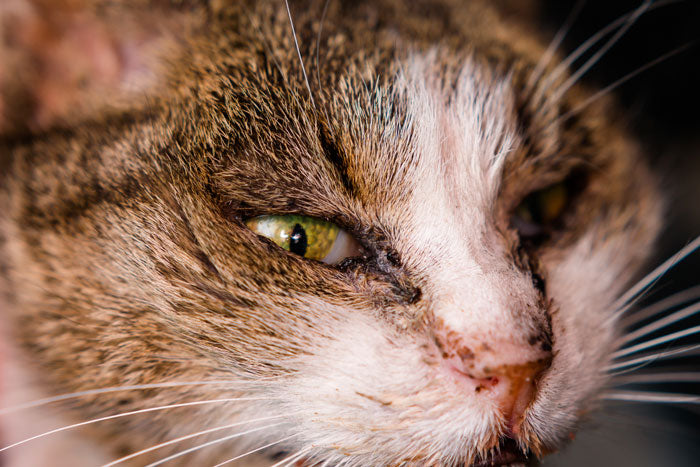
Relieving Cat Coryza with CBD: Effectiveness and Precautions
What is coryza?
Feline coryza, also known as "cat flu," is a highly contagious respiratory infection caused by several different viruses. The causative pathogens commonly include feline herpesvirus (FHV-1) and feline calicivirus (FCV). These viruses can spread rapidly in cat populations, especially in environments where cats live in groups, such as shelters and catteries.
Common Causes and Symptoms
Coryza is transmitted through nasal and eye discharge from infected cats. Common symptoms include:
- runny nose;
- frequent sneezing;
- watery eyes;
- conjunctivitis;
- loss of appetite;
- lethargy;
- sometimes fever.
Although coryza is usually mild, it can sometimes lead to more serious complications, especially in young, elderly, or immunocompromised cats.
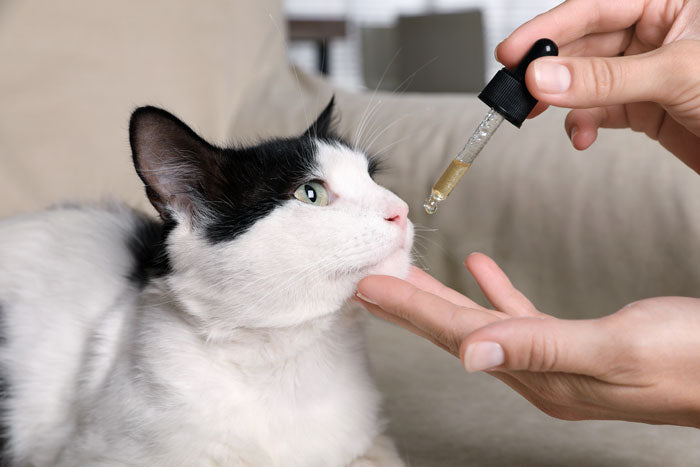
CBD: What is it?
Origin and properties of CBD
CBD, or cannabidiol, is a compound naturally present in the hemp plant. Unlike THC, it has no psychoactive effects and does not cause intoxication. CBD interacts with the endocannabinoid system, a complex network of receptors found throughout the body, including the central nervous system, immune system, and organs.
CBD interacts with the endocannabinoid system of cats
The endocannabinoid system plays a critical role in regulating many physiological processes in animals, including cats. When administered with CBD, it can help modulate inflammatory responses, regulate pain, and support immune function. This suggests that CBD could potentially offer many benefits to cats with the common cold.
Benefits of CBD for Cats with the Common Cold
Anti-inflammatory efficacy
When cats suffer from a cold, their airways can become inflamed, causing discomfort and difficulty breathing. In this context, the anti-inflammatory properties of CBD play a key role in reducing this inflammation.
By affecting the immune response and reducing the production of inflammatory cytokines, CBD can help soothe symptoms associated with the common cold, such as a runny nose and congestion.
Strengthening the immune system
The immune system's critical role in fighting viral infections, including the common cold, cannot be underestimated. CBD may act as an immunomodulator by enhancing the cat's natural immune response. By regulating inflammatory reactions, CBD balances immune system activity, potentially improving the cat's ability to fight the virus that causes the common cold.
However, it is important to note that CBD is not a replacement for conventional medical treatments and should be considered a supplement.
Calming and soothing effects
Symptoms of a runny nose, such as a runny nose, sneezing, and congestion, can disrupt a cat's overall well-being, causing discomfort and stress. The anxiolytic properties of CBD act directly on the nervous system to promote a sense of relaxation.
By regulating neurotransmitters, particularly serotonin, CBD helps calm the anxiety and stress associated with a cold. This sense of calm can help improve the cat's comfort during their recovery period, promoting a faster healing process.
Improving quality of life
Through its ability to reduce inflammation, boost the immune system, and provide calming effects, CBD can significantly improve the overall quality of life of cats suffering from the common cold. By alleviating uncomfortable symptoms such as a runny nose, congestion, and difficulty breathing, CBD can help cats regain their appetite, regain energy, and participate in normal activities.
This improvement in physical and emotional well-being plays a crucial role in the cat's recovery process, both during and after the coryza episode.
CBD Forms and Dosage Suitable for Cats
Types of CBD Products Available for Felines
- CBD Oils: CBD oils are easy to incorporate into your cat's daily diet. They offer precise dosing thanks to the dropper-based dispensers, but this may require some calculation and adjustment based on your cat's weight. The oils are discreet and convenient, ideal for cats who don't readily accept other forms of CBD.
- CBD Lozenges: CBD lozenges are an effortless option in terms of dosage, as each lozenge contains a specific amount of CBD. However, some cats may resist taking tablets, which can make administration more difficult. If your cat accepts tablets, this is a simple and convenient solution.
It is important to choose the form that best suits your cat's behavior and preferences, while also considering the appropriate dosage to ensure treatment effectiveness.
Dosage advice
The optimal CBD dosage depends on several factors, including your cat's weight, size, and specific condition. While every cat is unique, here's a rough guideline:
- For CBD oils: Start with about 0.1 to 0.5 mg of CBD per kilogram of your cat's body weight. For example, if your cat weighs 5 kg, you could start with a dose of about 0.5 to 2.5 mg of CBD. Monitor your cat's response carefully and gradually increase if necessary.
- For CBD lozenges: Follow the directions on the product packaging. Generally, one lozenge per day is recommended for cats. Be sure to read the instructions carefully and do not exceed the recommended dosage.
Consulting a veterinarian is essential to determine the correct dosage for your cat. Every cat reacts differently to CBD, and a veterinarian will be able to adjust the dose based on your cat's response and specific needs.
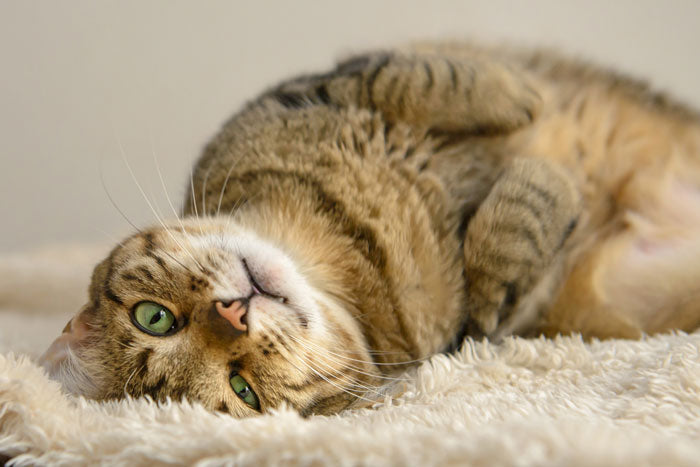
Precautions to take before giving CBD to cats
Possible drug interactions
It's important to note that CBD is generally well tolerated by cats, and side effects are rare. In the vast majority of cases, hemp-derived CBD is considered safe and non-toxic. However, as with any dietary supplement, mild side effects may occur.
Potential side effects of CBD in cats may include mild drowsiness, dry mouth, and decreased blood pressure. It is essential to monitor your cat closely after initial administration of CBD for any unusual reactions.
It is also recommended to start with low doses and observe how your cat reacts. If you have any concerns about side effects or your cat's reaction, do not hesitate to consult a veterinarian for advice and information specific to your pet's situation.
Importance of consulting a veterinarian
Before introducing CBD into your cat's care routine, it's crucial to consult a veterinarian. An animal health professional can assess your cat's health, determine the appropriate dose of CBD based on their weight and condition, and provide you with personalized advice.
CBD and coryza in cats: Towards natural and optimized well-being
In summary, coryza in cats can cause significant discomfort, but CBD offers a promising option to help alleviate symptoms and improve the quality of life of our feline friends .
As a natural alternative, CBD doesn't claim to cure the common cold, but it can play a supportive role by providing overall relief, both physically and mentally. CBD's anti-inflammatory, immune-boosting, and calming properties make it a potentially beneficial supplement in managing the common cold.
It is essential to take precautions and recommendations into account when administering CBD to your cat. By carefully monitoring your cat's reactions and taking appropriate measures, you can help your companion overcome the common cold with greater comfort and well-being .
To learn more about CBD options for cats, be sure to explore our pet-friendly section on Famous CBD!




